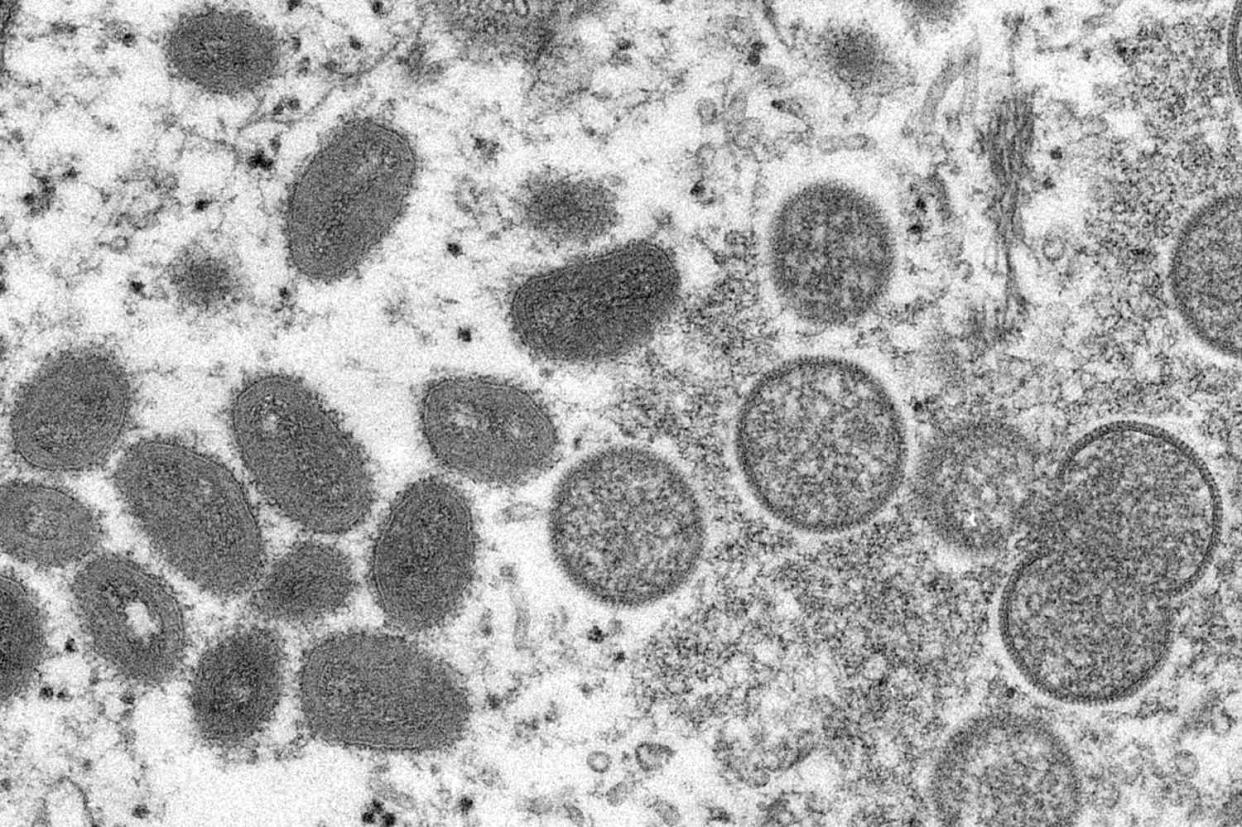Monkeypox 'Not a Sexually Transmitted Infection' but CDC Warns of Rashes in Genital Area

Cynthia S. Goldsmith, Russell Regner/CDC via AP Monkeypox virions
With monkeypox now in the U.S., the Centers for Disease Control is urging Americans to watch for rashes, particularly in the "genital or perianal area" based on the current cases.
In a press briefing, the CDC emphasized that monkeypox is "not a sexually transmitted infection," but a number of patients have developed rashes from the virus in the genital region that have been confused with sexually transmitted diseases.
"Anyone with a rash or lesion around or involving their genitals, their anus, or any other place that they have not seen it before should be fully evaluated, both for that rash, but particularly for sexually transmitted infection and other illnesses that can cause rash," Dr. John Brooks, a medical epidemiologist at the CDC's Division of HIV/AIDS Prevention, said.
The briefing was intended to alert Americans to watch out for monkeypox rashes, but also to inform medical providers that the rare virus is in the U.S. and to carefully evaluate possible patients. In one monkeypox case, Brooks said, a doctor thought the patient had "very severe herpes at first" and "didn't immediately think" it could be monkeypox.
RELATED: What to Know About Monkeypox — Including How It Spreads — as the CDC Confirms a U.S. Case
"This is why we recommend that all people encountering someone with a new rash or disease that could be monkeypox to get a good travel history and a sexual history" from the patient.
Jennifer McQuiston, the CDC's deputy director said that while monkeypox can be transmitted through respiratory droplets, "this isn't COVID," and it is not as contagious. The symptoms are also more intense: "this is very different than a sore throat, cough, upper respiratory virus," she said. "This is more flu-like."
She also emphasized that the U.S. has a stockpile of "100 million" smallpox vaccine doses — which is effective against monkeypox, even when administered after a person is diagnosed — if there is a need to use them.
The U.S. currently has one confirmed case of monkeypox in a man in Massachusetts who had recently traveled from Canada, and four confirmed cases of orthopoxvirus — which is the umbrella term for the family of viruses that includes monkeypox and smallpox — in New York City, Florida and Utah. All are men, and all have recently traveled internationally.
Worldwide, there are 92 confirmed cases and 28 suspected cases across 12 countries, according to the World Health Organization. The largest clusters are in Portugal, Spain and the United Kingdom, which has reported 56 cases so far.
RELATED VIDEO: Here are Some Myth-Busting Facts About COVID-19 Vaccines
The cases are surprising because the countries "are not endemic for monkeypox virus," WHO said. In recent years, cases have mostly been concentrated to the Congo — which typically sees thousands of monkeypox infections a year — and Nigeria, where there have been 200 confirmed and 500 reported cases since 2017, according to WHO.
The cases in the U.S. "are mild," McQuiston said. "I don't think that there's a great risk to the general community from monkeypox right now in the United States."
So far, many of the global cases of monkeypox have been in people who identify as gay or bisexual, Brooks said, and he, alongside McQuiston, in their Division of High Consequence Pathogens and Pathology, explained that they wanted to make that clear not to stigmatize the community, but to warn them of the possible risk of infection.
"Anyone can develop and spread monkeypox infection," Brooks said. "We want to help people make the best-informed decisions to protect their health and the health of their community from monkeypox."
RELATED: CDC Confirms First U.S. Case of Monkeypox in 2022, Health Officials Assure 'No Risk' to Public
And the "most infectious aspect of this disease are those lesions on the skin," McQuiston added. That's why they are warning people to be on the lookout for rashes.
"Remember infectious diseases don't care about borders or social networks," Brooks said. "Some groups may have a greater chance of exposure right now, but by no means is the current risk of exposure to monkeypox exclusively to the gay and bisexual community in the U.S."

 Yahoo Movies
Yahoo Movies 
